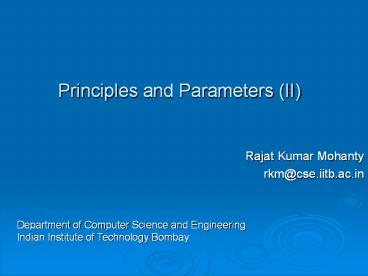Principles and Parameters (II) - PowerPoint PPT Presentation
Title:
Principles and Parameters (II)
Description:
Move- : Move any constituent anywhere (subject to other constraints) ... Pied-piping. spec. V ` VP. NP. V. I ` IP. NP. I. buy. NP. t. Who bought what ? C ` CP. spec. C ... – PowerPoint PPT presentation
Number of Views:189
Avg rating:3.0/5.0
Title: Principles and Parameters (II)
1
Principles and Parameters (II)
- Rajat Kumar Mohanty
- rkm_at_cse.iitb.ac.in
Department of Computer Science and
Engineering Indian Institute of Technology Bombay
2
Levels of Representation in Universal Grammar
(UG)
- Lexicon
Theta roles
X-bar rules
Constrained by theta criterion
D(eep)-Structure
Move-alpha
S(urface)-Structure
Transformational rules
Constrained by EPP
LF (logical form)
PF (phonetic form)
3
Universal Principles
Language specific Parameters
4
Outline
- Move-?
- Structure Preserving Hypothesis (SPH)
- Head Movement Constraint (HMC)
- Tensed S Condition (TSC)
- Doubly Filled COMP Filter
- Bounding Theory
- Subjacency Principle
5
D-structure to S-structure
- Move-? Move any constituent anywhere (subject
to other constraints) - S-structure the actual word order in a sentence
- D-structure is mapped onto S-structure by the
function Move-?
6
Move-?
- Movement Bounded / Unbounded
- Bounded movement rearranges the argument
structure of a verb and is confined to a minimal
clause. - Unbounded movement does not affect the argument
structure.
7
Move-?
- Types of movement
- NP-movement
- Wh-movement
- V-raising
- I-raising
- Restrictions
- Only maximal or zero-level categories can move
- For maximal categories, movement must be from an
A-position. It must be to a position that is not
?-marked. - For zero-level categories, Head Movement
Constraint must be satisfied.
8
Structure Preserving Hypothesis (SPH)
- SPH forces head categories to move to head
positions and maximal projections to maximal
(spec) positions. - Examples
- Which car will John fix?
- Will which car John fix?
9
CP
- Which car will John fix ?
C
NP
IP
C
I
NP
Which car
will
VP
I
V
spec
John
Tense AGR EPP WILL
t
NP
V
fix
t
10
CP
- Will which car John fix ?
C
NP
IP
C
I
NP
VP
will
Which car
I
V
spec
John
Tense AGR EPP WILL
t
NP
V
Violation of SPH
fix
t
11
Head Movement Constraint (HMC)
- Movement of an X0 category ? is restricted to the
position of a head ? that governs the maximal
projection of ?. - According to HMC, movement of the verb is
restricted to I.
12
- The ship sank
IP
I
NP
The ship
VP
I
Tense AGR EPP
V
V-raising
V
NP
ti
sink
Unaccusative Movement
13
IP
- John seems to be happy.
I
NP
I
VP
Tensed S Condition (TSC) Move an NP to an empty
position provided the NP is not contained in a
tensed S.
N
spec
V
N
Tense AGR EPP
IP
V
John
I
ti
seem
e
I
VP
Tense AGR EPP TO
V
ti
V
AP
be
happy
14
IP
- It seems that John is happy.
I
NP
I
VP
Tensed S Condition (TSC) Move an NP to an empty
position provided the NP is not contained in a
tensed S.
N
spec
V
N
Tense AGR EPP
CP
V
It
C
spec
seem
e
C
IP
that
John is happy
15
- The ball was kicked
IP
I
NP
The ball
VP
I
Tense AGR EPP BE -EN
V
V
NP
ti
kick
Passivization
16
IP
- The man who I met was John
I
NP
N
Det
Tense AGR EPP
VP
I
CP
N
spec
V
the
spec
C
N
NP
V
IP
C
be
John
man
I
NP
who
VP
I
I
Tense AGR EPP
NP
V
V
NP
Relativization
t
meet
17
Doubly Filled COMP Filter
- The man who I met was John.
- The man who that I met was John.
- COMP cannot contain both a wh-element and a
complementizer - (parametric variation)
18
CP
- who did you give the book to ?
C
NP
IP
C
I
NP
v P
I
v
spec
you
Tense AGR EPP DO
v
VP
ti
who
V
give
NP
PP
V
P
the book
NP
P
t
t
to
19
CP
- To whom did you give the book ?
C
PP
IP
C
I
NP
v P
I
v
spec
you
Tense AGR EPP DO
v
VP
ti
To whom
V
give
NP
PP
V
the book
Pied-piping
t
t
20
- Who bought what ?
CP
C
spec
IP
C
NP
I
NP
VP
who
I
V
spec
t
Tense AGR EPP
t
NP
V
PF movement
buy
what
21
- Who bought what ?
CP
C
spec
IP
C
I
NP
NP
VP
I
who
what
V
spec
t
Tense AGR EPP
t
NP
V
PF movement
buy
t
LF movement
22
CP
- who do you think that John likes ?
C
NP
IP
C
I
NP
VP
I
V
spec
you
Tense AGR EPP DO
CP
t
V
who
spec
C
think
t
IP
C
Cycle-2
John likes t
that
Cycle-1
23
- CP who do IP you think CP t that IP John
likes t
Violation of subjacency principle
24
Bounding Theory
- Subjacency principle
- (subordinate adjacency)
- Movement must not cross more than one bounding
nodes in one cycle - Bounding Nodes (English) IP, DP
- (parametric variation)
25
- IP It seems CP that IP John is likely IP t to
pass the exam
IP John seems CP that IP t is likely IP t
to pass the exam
Violation of TSC
IP John seems CP that IP it is likely IP t
to pass the exam
Violation of subjacency
26
Sources and further readings
- Comsky, Noam. 1965. Aspects of the Theory of
Syntax. CUP, Cambridge. - Comsky, Noam. 1981. Lectures on Government and
Binding. Foris, Dordrecht. - Ouhalla, Jamal. 1994. Introducing
Transformational grammar. Arnold, London.
27
THANK YOU































